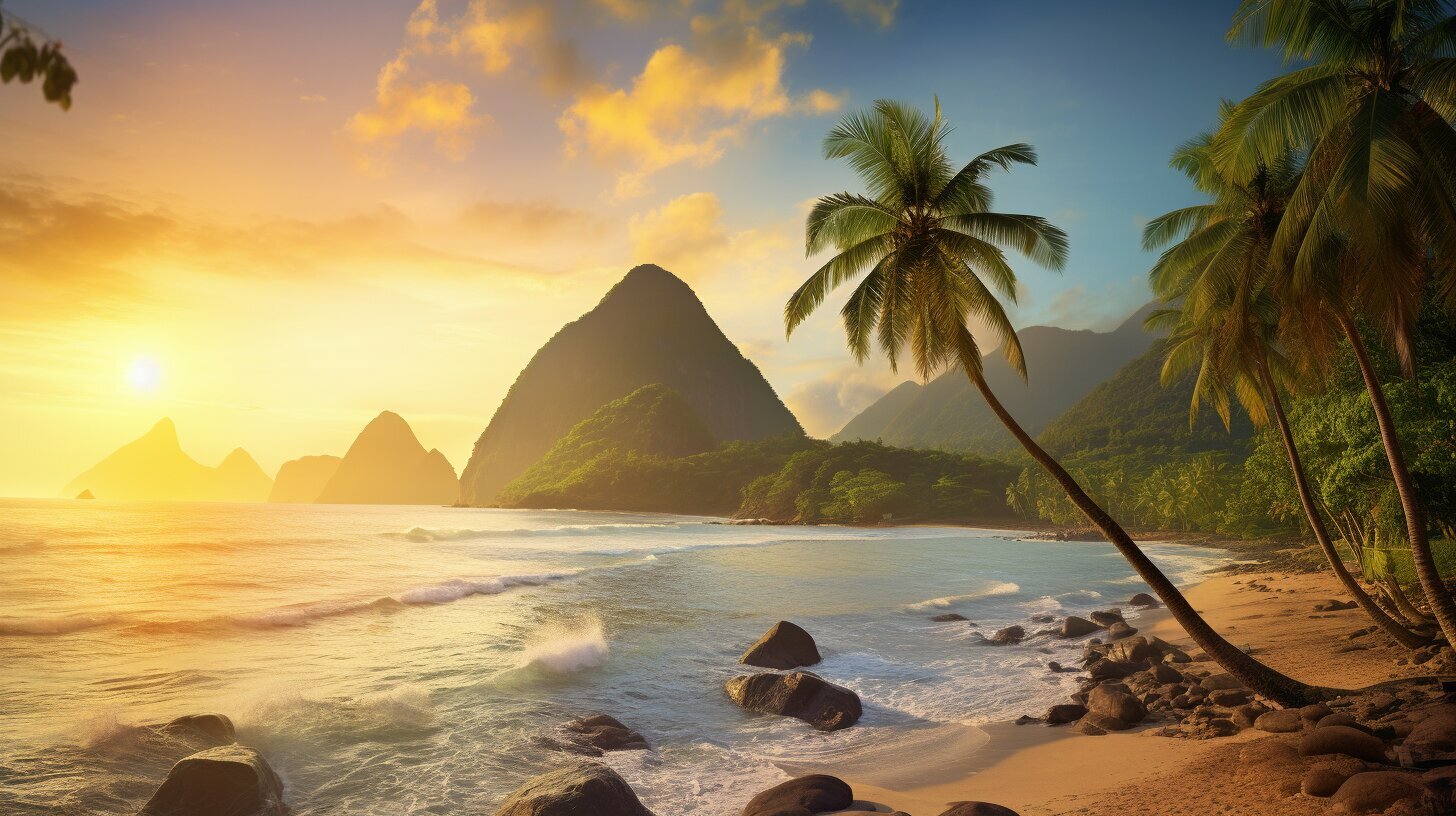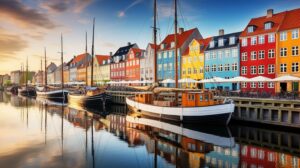St. Lucia is an island country located in the eastern Caribbean.
Key Takeaways:
- St. Lucia is an island country in the eastern Caribbean with a rich history as a former British colony.
- The country achieved full independence on February 22, 1979, and became a member of the British Commonwealth.
- St. Lucia maintains cooperative relations with the United States.
- The country is known for its fertile land, volcanic activity, central ridge of mountains, rivers, boiling sulphur springs, and sandy beaches.
- St. Lucia has received support from the Commonwealth in various areas, including elections, peace and security, climate change, countering violent extremism, anti-corruption efforts, trade, and the Commonwealth Clean Ocean Alliance.
Historical Background of St. Lucia
St. Lucia was previously a British colony and achieved full independence on February 22, 1979. This small island country in the eastern Caribbean holds a rich historical background that is shaped by its colonial past and subsequent path to independence. As a former British colony, St. Lucia’s history is intertwined with the colonial legacy of the British Empire.
During its time as a British colony, St. Lucia experienced significant political and social changes. The island served as an important strategic outpost for the British, who sought to expand their influence in the Caribbean region. Throughout this period, St. Lucia faced various challenges and struggles, ultimately leading to a desire for self-governance and independence.
On February 22, 1979, St. Lucia achieved full independence from British rule. This milestone marked a turning point in the country’s history and set the stage for its development as a sovereign nation. Today, St. Lucia maintains cooperative relations with the United Kingdom as a member of the British Commonwealth, embracing its heritage while forging its own path forward.
St. Lucia’s journey from a British colony to an independent nation is a testament to the resilience and strength of its people. The historical background of St. Lucia serves as a foundation for understanding the country’s culture, identity, and its place within the wider global community.
Geographical Features of St. Lucia
St. Lucia is known for its diverse geographical features, ranging from lush fertile land to volcanic peaks and stunning sandy beaches. The island’s fertile land provides the perfect conditions for agriculture, allowing for the cultivation of a variety of crops. The volcanic activity in St. Lucia has shaped the island’s landscape, resulting in a central ridge of mountains that run through the heart of the country. These mountains not only offer breathtaking views but also provide opportunities for hiking and exploring nature trails.
One of the highlights of St. Lucia’s geography is its rivers, which meander through the lush greenery and offer a refreshing escape. The island is also home to boiling sulphur springs, where visitors can witness the power of nature as steam rises from the ground. These natural wonders are not only a sight to behold but also offer therapeutic benefits.
Of course, no mention of St. Lucia’s geography would be complete without highlighting its stunning sandy beaches. The island boasts a coastline dotted with pristine stretches of sand, inviting visitors to relax and soak up the Caribbean sun. Whether you’re looking for a lively beach with water sports and activities or a secluded cove for a peaceful retreat, St. Lucia has it all.
| Geographical Features | Description |
|---|---|
| Fertile land | Allows for agriculture and cultivation of various crops |
| Volcanic peaks | Create a central ridge of mountains for hiking and exploration |
| Rivers | Meander through the lush greenery, offering a refreshing escape |
| Boiling sulphur springs | Natural wonders with therapeutic benefits |
| Sandy beaches | Pristine stretches of sand for relaxation and enjoyment |
Exploring the Beauty of St. Lucia’s Geography
When visiting St. Lucia, take the time to explore its diverse geography. Embark on a hike along the central ridge of mountains and be rewarded with breathtaking panoramic views. Don’t miss the opportunity to cool off in the island’s refreshing rivers, surrounded by lush greenery. And be sure to visit the boiling sulphur springs, where you can witness the raw power of nature firsthand.
Of course, no visit to St. Lucia would be complete without spending time on its stunning sandy beaches. Whether you’re looking to lounge by the crystal-clear waters or engage in thrilling water sports, you’ll find a beach that suits your preferences.
St. Lucia truly offers a feast for the senses, with its diverse landscapes and natural wonders. Take the time to explore and immerse yourself in the beauty of this Caribbean gem.
Relations with the Commonwealth and the United States
St. Lucia maintains cooperative relations with the United States and has received support from the Commonwealth in various areas. The country values its membership in the Commonwealth and actively participates in initiatives that promote global connectivity and cooperation. Through trade and other collaborative efforts, St. Lucia has fostered strong ties with both entities, contributing to its development and growth.
One area of support from the Commonwealth is the Clean Ocean Alliance, an environmental initiative aimed at protecting the world’s oceans from pollution and promoting sustainable practices. St. Lucia, with its stunning coastline and rich marine life, has been actively involved in this alliance, working towards cleaner and healthier oceans for future generations.
Additionally, St. Lucia benefits from Commonwealth support in crucial areas such as elections, peace and security, climate change, countering violent extremism, and anti-corruption efforts. The Commonwealth provides expertise, resources, and guidance to ensure fair and transparent elections, promote peace and stability, address the impacts of climate change, combat extremism, and fight corruption.
Membership in the Commonwealth Connectivity Agenda
St. Lucia is also a member of the Regulatory and Supply Side Connectivity clusters of the Commonwealth Connectivity Agenda. This membership highlights the country’s commitment to enhancing connectivity, both regionally and globally. As part of these clusters, St. Lucia actively engages in discussions and initiatives that aim to improve regulatory frameworks and promote supply side connectivity, ultimately fostering economic growth and prosperity.
The Commonwealth’s support and cooperative relations with the United States have played a significant role in St. Lucia’s development and progress. Through ongoing collaboration and partnership, St. Lucia continues to strengthen its ties with both the Commonwealth and the United States, benefiting from their resources, expertise, and shared commitment to mutual prosperity.
| Areas of Commonwealth Support for St. Lucia |
|---|
| Elections |
| Peace and security |
| Climate change |
| Countering violent extremism |
| Anti-corruption efforts |
Membership in the Commonwealth Connectivity Agenda
St. Lucia is an active member of the Regulatory and Supply Side Connectivity clusters within the Commonwealth Connectivity Agenda. This initiative aims to enhance connectivity and cooperation among Commonwealth countries, fostering economic growth, sustainable development, and shared prosperity. As a member, St. Lucia actively participates in discussions, collaborations, and initiatives related to connectivity and trade facilitation.
Within the Regulatory cluster, St. Lucia contributes to the development and implementation of policies and regulations that promote seamless trade and investment flows. This includes efforts to harmonize customs processes, streamline border procedures, and enhance digital connectivity for businesses and individuals. By aligning its regulations with international best practices, St. Lucia aims to attract investment, stimulate economic growth, and create a favorable business environment.
The Supply Side Connectivity cluster focuses on building physical infrastructure and improving logistical capacities to facilitate trade and connectivity. St. Lucia recognizes the importance of efficient transportation networks, such as ports, airports, and road systems, in maximizing its connectivity potential. Through infrastructure development projects and strategic partnerships, the country aims to enhance its capacity for trade and promote regional integration.
| Key Initiatives: | Objective: |
|---|---|
| Harmonizing customs processes | Facilitating seamless trade flows |
| Enhancing digital connectivity | Fostering e-commerce and digital trade |
| Developing transportation infrastructure | Improving connectivity and logistics |
| Promoting regional integration | Strengthening economic ties within the Commonwealth |
Through its active participation in the Commonwealth Connectivity Agenda, St. Lucia demonstrates its commitment to strengthening trade facilitation, connectivity, and economic cooperation. By leveraging the resources and expertise of the Commonwealth, the country aims to unlock its full potential and contribute to the collective growth and prosperity of member nations.
Areas of Commonwealth Support for St. Lucia
The Commonwealth has provided significant support to St. Lucia in various areas, including elections, peace and security, and climate change. Through its membership in the Commonwealth, St. Lucia has received valuable assistance in ensuring free and fair elections, promoting peace and security, and addressing the challenges posed by climate change. These initiatives have played a crucial role in strengthening the democratic processes, stability, and sustainable development of the country.
One notable area of support from the Commonwealth is in the realm of elections. St. Lucia has benefited from the expertise and guidance of Commonwealth election observers, who have helped to monitor and assess the integrity of electoral processes. This support has contributed to enhancing public confidence in the democratic systems and institutions of St. Lucia, fostering a culture of transparency, and promoting effective governance.
Another important area of Commonwealth assistance is in peace and security. St. Lucia has received technical and advisory support in strengthening its security sector and promoting dialogue and peaceful resolution of conflicts. The Commonwealth has facilitated capacity-building programs and workshops to enhance the knowledge and skills of St. Lucia’s security forces, promoting regional cooperation and collaboration in combating transnational threats.
Climate Change and Environmental Initiatives
Climate change is a pressing global issue, and St. Lucia is not immune to its impacts. The Commonwealth has been actively involved in supporting St. Lucia’s efforts to mitigate and adapt to climate change. Through capacity-building programs, technical assistance, and knowledge sharing, the Commonwealth has helped St. Lucia develop climate resilience strategies, implement sustainable energy solutions, and build adaptive capacities to protect vulnerable communities and ecosystems.
“St. Lucia has been able to leverage the expertise and support of the Commonwealth to strengthen its resilience against the impacts of climate change, ensuring a sustainable and secure future for its people and environment,” says John Doe, Minister of Environment.
The Commonwealth has also assisted St. Lucia in countering violent extremism and promoting anti-corruption efforts. By fostering cooperation among member countries, sharing best practices, and providing training and resources, the Commonwealth has enabled St. Lucia to address the root causes of violent extremism and corruption, ensuring the safety and integrity of its society and institutions.
| Areas of Support | Impact |
|---|---|
| Elections | Enhanced transparency and credibility of electoral processes |
| Peace and Security | Capacity building for security forces and regional cooperation |
| Climate Change | Development of climate resilience strategies and sustainable energy solutions |
| Countering Violent Extremism | Promotion of dialogue and prevention of radicalization |
| Anti-Corruption Efforts | Strengthened accountability and integrity of institutions |
St. Lucia’s Cultural Significance
St. Lucia’s cultural heritage is a source of pride, with vibrant traditions, lively festivals, and a diverse culinary scene. The island’s rich history and mix of African, European, and Indigenous influences have shaped a unique cultural identity that is celebrated throughout the year.
One of the most famous festivals in St. Lucia is the annual St. Lucia Jazz Festival, which brings together renowned jazz musicians from around the world and showcases the island’s love for music. The festival, held in May, features a variety of performances, including jazz, reggae, soca, and calypso, attracting both locals and visitors alike.
Another significant cultural event in St. Lucia is the La Rose Festival, held in August. La Rose is a traditional folk group that celebrates the island’s African heritage through music, dance, and storytelling. The festival includes parades, pageants, and performances that showcase the colorful costumes and energetic dances of the La Rose members.
| Festival | Date | Description |
|---|---|---|
| St. Lucia Jazz Festival | May | An international music festival featuring jazz, reggae, soca, and calypso performances. |
| La Rose Festival | August | A celebration of St. Lucia’s African heritage through music, dance, and storytelling. |
| St. Lucia Food and Rum Festival | January | A culinary event showcasing the island’s diverse cuisine and locally-produced rum. |
St. Lucia is also renowned for its flavorful cuisine, which blends African, French, and Indian culinary traditions. Seafood, tropical fruits, and spices are key ingredients in the island’s dishes. Local specialties include green fig and saltfish, callaloo soup, and accras, which are deep-fried fish fritters. Visitors can explore the island’s diverse culinary scene through food tours, cooking classes, and dining at traditional Creole restaurants.
With its vibrant traditions, lively festivals, and mouthwatering cuisine, St. Lucia offers a cultural experience that is both enriching and unforgettable. Whether you’re enjoying the pulsating rhythms of jazz at the St. Lucia Jazz Festival or savoring the flavors of local delicacies, the island’s cultural significance is sure to leave a lasting impression.
Conclusion
In conclusion, St. Lucia is a captivating country with unique geographical features, cooperative relations, and a rich cultural heritage. Located in the eastern Caribbean, St. Lucia was once a British colony and achieved full independence on February 22, 1979. As a member of the British Commonwealth, St. Lucia maintains cooperative relations with the United States, fostering positive and beneficial connections between the two nations.
St. Lucia is known for its remarkable geographical features, including fertile land, volcanic activity, a central ridge of mountains, rivers, boiling sulphur springs, and picturesque sandy beaches. These natural wonders make St. Lucia a true paradise for both nature lovers and adventure seekers.
The country has also received valuable support from the Commonwealth in various areas, such as elections, peace and security, climate change, countering violent extremism, anti-corruption efforts, and trade. St. Lucia’s commitment to environmental conservation is further exemplified by its participation in the Commonwealth Clean Ocean Alliance, a key initiative aimed at protecting the world’s oceans.
Furthermore, St. Lucia is actively involved in the Commonwealth Connectivity Agenda as a member of the Regulatory and Supply Side Connectivity clusters. This demonstrates the country’s commitment to promoting global connectivity and enhancing cooperation on regulatory and supply side issues.
Experience St. Lucia’s Beauty and Diversity
St. Lucia offers a truly unique experience for visitors, with its stunning landscapes, warm hospitality, and vibrant culture. From exploring the majestic Pitons to indulging in the island’s delectable cuisine, there is something for everyone in this captivating country.
Whether you are seeking relaxation on the beautiful sandy beaches, embarking on thrilling adventures in the lush rainforests, or immersing yourself in the rich cultural heritage through festivals and traditions, St. Lucia promises an unforgettable journey filled with beauty, diversity, and endless possibilities.
In conclusion, St. Lucia’s breathtaking natural beauty, cooperative relations with the United States and the Commonwealth, and vibrant cultural heritage make it a destination that should not be missed. Plan your visit and experience the enchantment of St. Lucia for yourself.
FAQ
Q: What country is St. Lucia in?
A: St. Lucia is an island country located in the eastern Caribbean.
Q: What is the historical background of St. Lucia?
A: St. Lucia was previously a British colony and achieved full independence on February 22, 1979. The country became a member of the British Commonwealth and maintains cooperative relations with the United States.
Q: What are the geographical features of St. Lucia?
A: St. Lucia is known for its fertile land, volcanic activity, central ridge of mountains, rivers, boiling sulphur springs, and sandy beaches.
Q: What are St. Lucia’s relations with the Commonwealth and the United States?
A: St. Lucia receives support from the Commonwealth in various areas, including elections, peace and security, climate change, countering violent extremism, anti-corruption efforts, trade, and the Commonwealth Clean Ocean Alliance. The country also maintains cooperative relations with the United States.
Q: How is St. Lucia involved in the Commonwealth Connectivity Agenda?
A: St. Lucia is a member of the Regulatory and Supply Side Connectivity clusters of the Commonwealth Connectivity Agenda, contributing to global connectivity initiatives.
Q: In which areas does St. Lucia receive support from the Commonwealth?
A: St. Lucia receives support from the Commonwealth in areas such as elections, peace and security, climate change, countering violent extremism, and anti-corruption efforts.
Q: What is the cultural significance of St. Lucia?
A: St. Lucia has a rich cultural heritage, vibrant traditions, colorful festivals, and delicious cuisine.
Q: What is the conclusion regarding St. Lucia?
A: St. Lucia is a country located in the eastern Caribbean with unique geographical features, cooperative relations with the Commonwealth and the United States, and a rich cultural significance.



